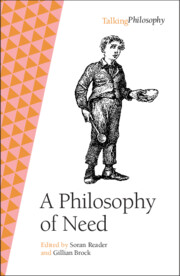Book contents
- A Philosophy of Need
- Talking Philosophy
- A Philosophy of Need
- Copyright page
- Contents
- List of Contributors
- Foreword
- Introduction
- 1 An Idea We Cannot Do Without: What Difference Will It Make (eg. to Moral, Political and Environmental Philosophy) to Recognize and Put to Use a Substantial Conception of Need?
- 2 Needs and Global Justice
- 3 Need, Humiliation and Independence
- 4 Needs and Ethics in Ancient Philosophy
- 5 Aristotle on Necessities and Needs
- 6 Need, Care and Obligation
- 7 Needs, Facts, Goodness, and Truth
- 8 Fundamental Needs
- 9 Needs, Rights, and Collective Obligations
- 10 Where Does the Moral Force of the Concept of Needs Reside and When?
- 11 Needs and Capabilities
- Index
11 - Needs and Capabilities
Published online by Cambridge University Press: 25 April 2024
- A Philosophy of Need
- Talking Philosophy
- A Philosophy of Need
- Copyright page
- Contents
- List of Contributors
- Foreword
- Introduction
- 1 An Idea We Cannot Do Without: What Difference Will It Make (eg. to Moral, Political and Environmental Philosophy) to Recognize and Put to Use a Substantial Conception of Need?
- 2 Needs and Global Justice
- 3 Need, Humiliation and Independence
- 4 Needs and Ethics in Ancient Philosophy
- 5 Aristotle on Necessities and Needs
- 6 Need, Care and Obligation
- 7 Needs, Facts, Goodness, and Truth
- 8 Fundamental Needs
- 9 Needs, Rights, and Collective Obligations
- 10 Where Does the Moral Force of the Concept of Needs Reside and When?
- 11 Needs and Capabilities
- Index
Summary
How should actions to redress absolute human deprivation be framed?1 Current international coordinated actions on absolute poverty are framed by human rights or by goals such as the Millennium Development Goals. But appropriate, effective and sustained responses to needs require localized participation in the definition of those rights/goals/needs and in measures taken to redress them. Human rights or the MDGs do not seem necessarily to require such processes. For this reason some argue that no universal framework can describe economic, social, or cultural rights. Yet to address absolute poverty purely from the local perspective still requires the identification and prioritization of capabilities or needs, and often requires actions by greater-than-local institutions, so in practical terms a framework is not rejected without cost. This paper argues that the identification and prioritisation of rights or MDGs can and should be done at an international level, but that they might be framed as capabilities, and that far greater attention need be given to the iterative specification of these rights, and to the ongoing protection of certain agency freedoms. The paper explores how Wiggins’ account of need can fruitfully inform the specification of needs claims. It also draws significantly on Sen’s work to identify the intrinsic importance of process and opportunity freedoms, and to identify how these can relate to universal priorities.
- Type
- Chapter
- Information
- A Philosophy of Need , pp. 339 - 374Publisher: Cambridge University PressPrint publication year: 2024

